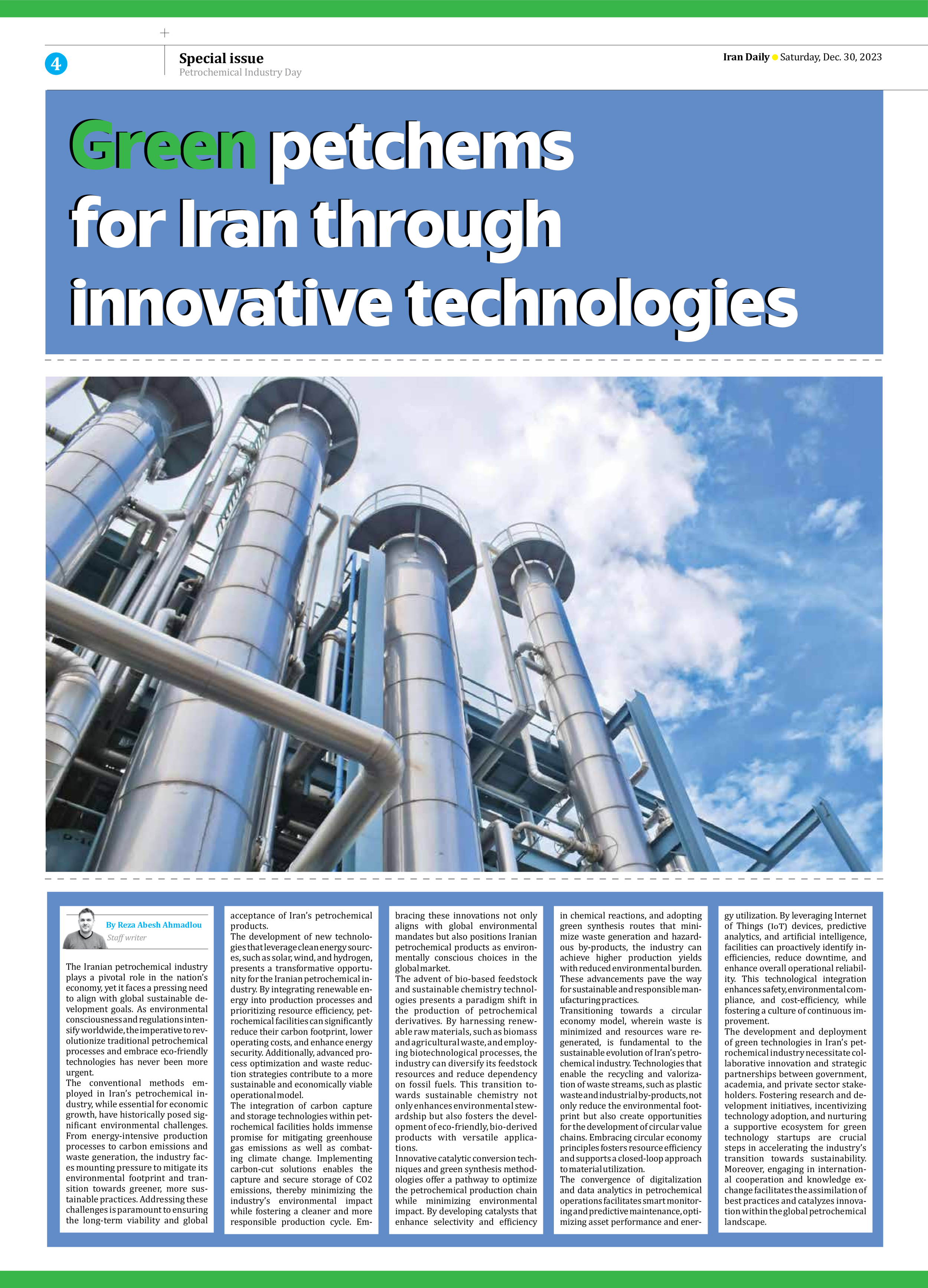
Green petchems for Iran through innovative technologies
By Reza Abesh Ahmadlou
Staff writer
The Iranian petrochemical industry plays a pivotal role in the nation’s economy, yet it faces a pressing need to align with global sustainable development goals. As environmental consciousness and regulations intensify worldwide, the imperative to revolutionize traditional petrochemical processes and embrace eco-friendly technologies has never been more urgent.
The conventional methods employed in Iran’s petrochemical industry, while essential for economic growth, have historically posed significant environmental challenges. From energy-intensive production processes to carbon emissions and waste generation, the industry faces mounting pressure to mitigate its environmental footprint and transition towards greener, more sustainable practices. Addressing these challenges is paramount to ensuring the long-term viability and global acceptance of Iran’s petrochemical products.
The development of new technologies that leverage clean energy sources, such as solar, wind, and hydrogen, presents a transformative opportunity for the Iranian petrochemical industry. By integrating renewable energy into production processes and prioritizing resource efficiency, petrochemical facilities can significantly reduce their carbon footprint, lower operating costs, and enhance energy security. Additionally, advanced process optimization and waste reduction strategies contribute to a more sustainable and economically viable operational model.
The integration of carbon capture and storage technologies within petrochemical facilities holds immense promise for mitigating greenhouse gas emissions as well as combating climate change. Implementing carbon-cut solutions enables the capture and secure storage of CO2 emissions, thereby minimizing the industry’s environmental impact while fostering a cleaner and more responsible production cycle. Embracing these innovations not only aligns with global environmental mandates but also positions Iranian petrochemical products as environmentally conscious choices in the global market.
The advent of bio-based feedstock and sustainable chemistry technologies presents a paradigm shift in the production of petrochemical derivatives. By harnessing renewable raw materials, such as biomass and agricultural waste, and employing biotechnological processes, the industry can diversify its feedstock resources and reduce dependency on fossil fuels. This transition towards sustainable chemistry not only enhances environmental stewardship but also fosters the development of eco-friendly, bio-derived products with versatile applications.
Innovative catalytic conversion techniques and green synthesis methodologies offer a pathway to optimize the petrochemical production chain while minimizing environmental impact. By developing catalysts that enhance selectivity and efficiency in chemical reactions, and adopting green synthesis routes that minimize waste generation and hazardous by-products, the industry can achieve higher production yields with reduced environmental burden. These advancements pave the way for sustainable and responsible manufacturing practices.
Transitioning towards a circular economy model, wherein waste is minimized and resources ware regenerated, is fundamental to the sustainable evolution of Iran’s petrochemical industry. Technologies that enable the recycling and valorization of waste streams, such as plastic waste and industrial by-products, not only reduce the environmental footprint but also create opportunities for the development of circular value chains. Embracing circular economy principles fosters resource efficiency and supports a closed-loop approach to material utilization.
The convergence of digitalization and data analytics in petrochemical operations facilitates smart monitoring and predictive maintenance, optimizing asset performance and energy utilization. By leveraging Internet of Things (IoT) devices, predictive analytics, and artificial intelligence, facilities can proactively identify inefficiencies, reduce downtime, and enhance overall operational reliability. This technological integration enhances safety, environmental compliance, and cost-efficiency, while fostering a culture of continuous improvement.
The development and deployment of green technologies in Iran’s petrochemical industry necessitate collaborative innovation and strategic partnerships between government, academia, and private sector stakeholders. Fostering research and development initiatives, incentivizing technology adoption, and nurturing a supportive ecosystem for green technology startups are crucial steps in accelerating the industry’s transition towards sustainability. Moreover, engaging in international cooperation and knowledge exchange facilitates the assimilation of best practices and catalyzes innovation within the global petrochemical landscape.







